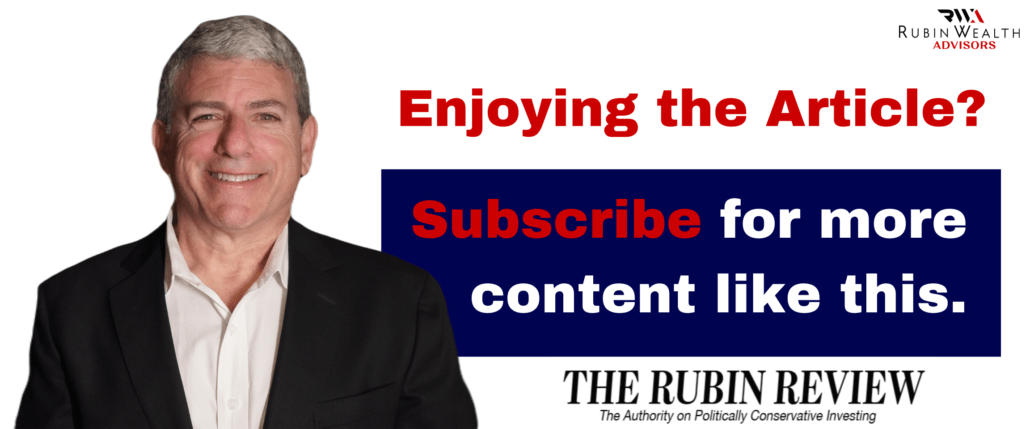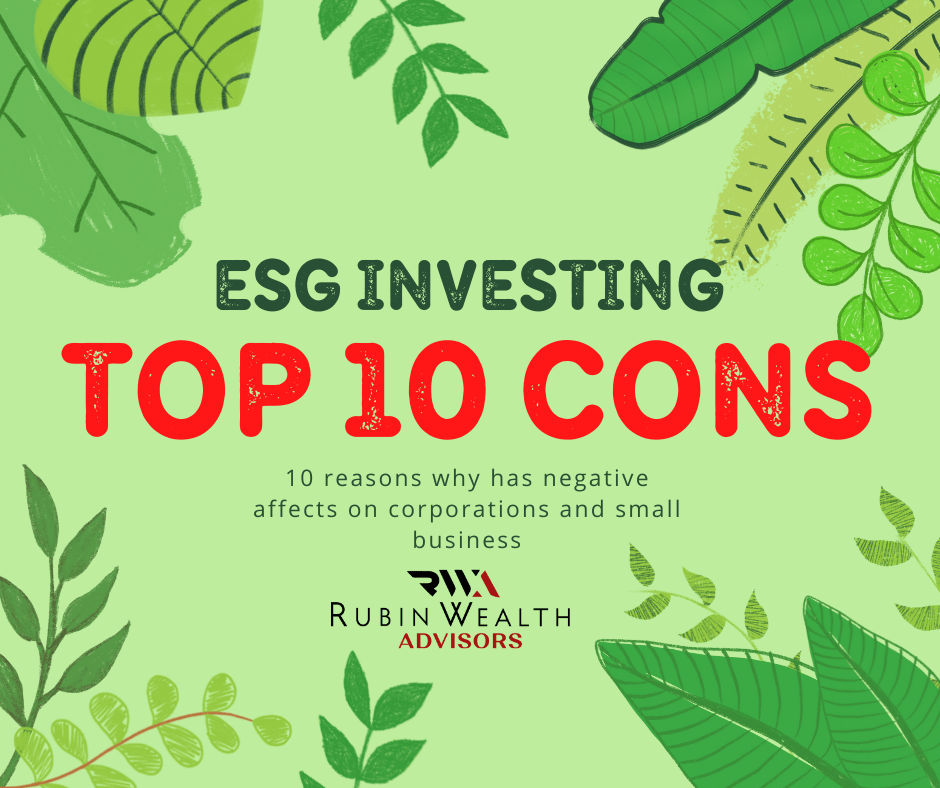ESG investing may be popular, but be careful: there are many things to dislike.
/in Uncategorized /by Bob Rubin
The environmental, social, and governance (ESG) movement is the latest part of a more significant effort to use undemocratic means to achieve public policy goals. As the Business Roundtable tried to replace the focus on maximizing shareholder value with a broader duty to “stakeholders,” ESG initiatives want to replace the long-standing principle of companies and investors on profit and financial return with vague ideas of “sustainability” as a way to make decisions and decide where to put assets in the private sector.
ESG is based on ideas that have been around for a long time. Socially responsible investing and its predecessors are ways of investing that consider the economic effects of limiting investment choices. People who aren’t allowed to invest in “sin” industries let others take advantage of potentially profitable opportunities in, say, tobacco or gun companies. However, they know doing so means giving up economic returns in exchange for some other form of psychic value. This is a clear-eyed tradeoff of costs and benefits, even if it isn’t the most profitable.
ESG, on the other hand, has been called an evolution of socially responsible investing that goes beyond just using a “negative filter” to avoid investing in companies that do certain things. Standard & Poor’s says that ESG “provides a broader framework for looking at social impact than just excluding companies with a history of bad results.” It lets people in the market use positive and negative screens to invest in companies that they think are using sustainable practices, such as protecting the environment, and consumers, respecting human rights and having a mix of people of different races and genders. This strategy puts moral values ahead of financial returns.

This last point is getting more and more attention from commentators, people who trade on the market, and people who make policy. Proponents of ESG investing say that it can produce “alpha” or higher returns than expected based on the risk of an investment or portfolio. However, academic research suggests that this is not the case. Unless one is willing to throw out the efficient markets hypothesis completely, it seems clear that any temporary investment advantage from an ESG strategy would soon be arbitraged by how securities markets work. A diversified portfolio of high-scoring ESG companies would likely do worse than a similarly diversified portfolio that didn’t consider ESG. This is because it costs money to choose, track, and report on ESG investments.
Even if ESG strategies are oversold as “doing well by doing good” and only do as well as or slightly worse than index funds, is it wrong for institutional investors to use ESG factors to help them decide how to invest? Applying ESG principles to business management and institutional asset allocation presents several problems and harmful effects.
First, it takes a lot of work to figure out what makes an ESG company with a high score in real life. Even though ESG-driven investing is a relatively new trend, there are already several ESG rating services, and research shows that ESG ratings of the same company can vary a lot between these services (in contrast to bond credit ratings, which are tightly clustered). In one such study, a team from MIT Sloan’s Sustainability Initiative found a correlation of 0.61 between the ratings of five well-known ESG rating agencies. The correlation between the credit ratings of S&P and Moody’s is 0.99. Free cash flow and fixed asset coverage are more flexible criteria than the ones mentioned above. Due to this subjectivity and the fact that everything ESG is popular right now, ESG mandates leave room for service providers in the ESG ecosystem to act in a way that looks for rent.
The fact that ESG ratings are subjective and sometimes follow different rules shows another problem with ESG-driven investing: the tension between the E, S, and G. How to weigh environmental results against the social responsibilities of a company? How does governance rank among these, in turn? Also, “governance” in the ESG context is a misleading term in and of itself. In the traditional sense, good corporate or public-sector governance is based on openness, oversight, fairness, accountability, and, in the case of private enterprise governance, maximizing shareholder value. However, as stakeholder capitalism becomes more popular and mandates like diversity, equity, and inclusion (DEI) make their way into the boardroom, it may be hard to find a lasting agreement on what “good governance” means.
ESG’s lack of accountability is a much bigger problem than the fact that its principles are only sometimes easy to put into practice. This shows up in two different, but both bad, ways.
First, considering non-economic factors when making investment decisions goes against long-held legal and judicial ideas of fiduciary duty. A fiduciary’s role is to maximize the risk-adjusted return of plan assets by Section 404 of the Employment Retirement Income and Security Act of 1974 (ERISA). Putting non-financial factors into the process of choosing investments goes against this obligation. It shows one of the problems with what large institutional investors say about using ESG criteria. These “institutional investors” should be called “investment advisers” or “managers” because they invest on behalf of plan or fund beneficiaries, not for their accounts.
Even though ERISA makes it clear that these fiduciaries should try to get the best risk-adjusted return possible, and in stark contrast to ESG-focused or socially responsible mutual funds that the ultimate beneficial owner chooses for their ESG characteristics, it is irresponsible to use non-economic criteria without getting the end-permission, investor’s and to put this over getting the best risk-adjusted return possible.
ESG is just as bad for responsible financial management as it is for the idea that responsive and accountable democratic institutions should set the public policy agenda for society. No matter how good the goals that are part of ESG criteria are, they are better and more appropriate to be pursued through laws and rules, with the consent of the people being governed or their democratically elected representatives. When the private sector takes responsibility for public policy, it breaks the link between representative government and electoral accountability. It also uses capital markets to allocate resources and impose financial consequences based on things that have nothing to do with economics. Finally, it gives control over the direction of public policy to a group of institutional investors and corporate managers who are neither democratically legitimate nor necessarily experts in the field.
Even though ESG has good intentions, it is subjective, doesn’t make sense, and encourages people to act like rentiers. It also isn’t democratic, elitist, financially sound, lowers values, and doesn’t answer to anyone. What else is there not to like?

Are you concerned about inflation, ESG compliances, and the 2022 crypto crash?
Your investment portfolio can be affected by any or all of these factors.
Schedule an appointment with Bob Rubin, your dedicated, conservative financial advisor, for a free portfolio analysis today.
Get started by clicking the button below.
Related Articles
No BS… Just straight forward advice
Contact Bob, the Nation’s Predominant
Politically Conservative Financial Advisor Today!






